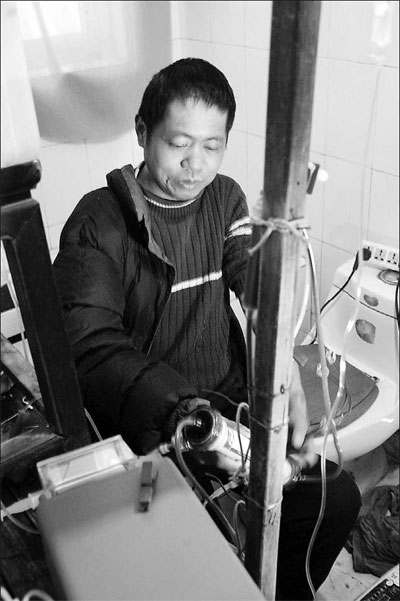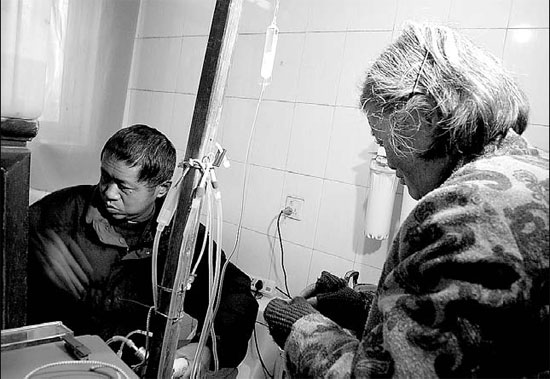Living by his own hand
Updated: 2013-01-22 05:45
By Cang Wei and Song Wenwei (China Daily)
|
||||||||
|
Hu Songwen undergoes hemodialysis using his homemade hemodialysis machine, which he has been dependent on for 13 years. Photos by Zhu Jipeng / China Photo Press |
|
Hu Songwen's 81-year-old mother, Huang Zhongfang, is his only hemodialysis assistant. |
An impoverished uremia patient has moved the public by constructing his own hemodialysis machine to stay alive. Cang Wei and Song Wenwei report in Nanjing.
Doctors agree it's a miracle that Hu Songwen has survived for 13 years because of his homemade hemodialysis machine.
The man recalls his life fell apart when he was diagnosed with uremia in 1993. He was a 21-year-old Nanjing Institute of Meteorology senior.
That morning, his face swelled. He had difficulty urinating. And he couldn't even stand on his own.
A medical examination showed both of his kidneys had failed.
The institute paid Hu's expensive medical bills for a year. It then sent him home to Qutang township in Jiangsu province's Hai'an county.
Hu's parents were factory workers, but each hemodialysis session cost 400 yuan ($64). At that time, his parents earned less than 1,500 yuan a month, but Hu needed more than 4,000 yuan every month to live.
The parents had done everything possible to save their son. In less than a year, they sold all their valuables and borrowed money from all of their relatives. After the money from the government and Hu's friends were spent, they couldn't afford food or housing.
"Do nothing but wait for death?" Hu says.
"I couldn't."
After reading books about the principles of hemodialysis, Hu - who excelled at chemistry and physics in high school - bought a cheap secondhand blood pump online and asked an acquaintance to purchase hemodialysis tubes.
"The principles of hemodialysis aren't complicated," Hu says.
"I had confidence I could overcome the difficulties I'd face."
On March 31, 1999 - a day he says he'll never forget - his homemade hemodialysis machine, filled with purified water and drugs, started to operate in his home's bathroom, which is smaller than 5 square meters.
Every tube used for hemodialysis costs about 100 yuan. To save money, Hu uses each more than 10 times, while they're only used once in hospitals.
He doesn't share the fears of many people around about bacterial infections and pollution.
"I just need to master the drug dosages and make sure to avoid getting any air in my veins," he says.
He used ceramic bowls to pour purified water into a steel pot, and heats the medicine in the microwave.
His 81-year-old mother, Huang Zhongfang, is his only hemodialysis assistant. She uses an old wooden scale to measure the fluid with her trembling hand and then feeds it into the machine.
Wooden scales are hardly used in even China's poorest areas.
"I would have died years ago if not for this homemade machine," Hu says.
It only costs him 60 yuan per session with his homemade machine.
"The risk of self-administering hemodialysis has been exaggerated in China," he believes.
"As far as I know, many foreigners do it. But I do it because of poverty."
Hu says the machine almost killed him once.
He felt extreme pain where he had injected himself and noticed the blood in the tube had changed color.
"I knew the dose was wrong," he says. "I immediately stopped and adjusted the concentration."
Hu says he still feels afraid when he recalls the incident.
He has been visited over the years by many uremia patients, who hoped he could teach them to do their own hemodialysis.
"I refused them all," he says.
"That's only because I dare not let others take the risk I do."
Two of those patients died.
More than a million people on the mainland live with uremia, and 120,000 new cases are diagnosed every year, the Guangzhou-based Southern Weekly newspaper reports.
China's medical insurance system and expensive healthcare costs mean many patients receive ineffective treatment.
Media occasionally highlight the issue. There was a coverage spike in 2009, when a DIY hemodialysis room built by 10 patients in Tongzhou, Beijing, was exposed.
They'd cooperated to raise funds and construct three machines. The patients lived in the room in a 300-square-meter house in a remote village for three years. But the local health bureau learned about the room and shut it down.
Sun Wei, director of the nephrology department of Jiangsu Provincial Hospital of Traditional Chinese Medicine, says self-administered hemodialysis can be dangerous because of irregular operation and infection risks.
"Reusing the equipment can cause infection, especially among uremia patients, whose immune systems are usually weakened," Sun says.
Hu kept his machine secret until last July, when he uploaded an 18-minute video to the Internet in hopes the exposure would lead to assistance from the public.
"My mother is very old, and her health has been rapidly deteriorating," he says.

"She needs to be taken care of, rather than care for me. I don't know if I can survive if anything happens to her. So, I uploaded the video as a plea for help."
His video went online around the time the country was moved by story of Liao Dan, who forged a hospital's seal to save his wife, who also had uremia.
Liao, a 41-year-old laid-off worker in Beijing, defrauded the hospital of 172,000 yuan by using a fake seal to pay medical bills he couldn't afford.
He was called "the greatest scammer" by the media, and received many donations from around he country.
After he posted the video, Hu received medical insurance, which pays for some of the drugs he needs.
In November 2012, the local government also applied for his subsistence allowance. He's expected to begin receiving the 450-yuan monthly allowance this month.
"While the money still isn't enough, my family's finances are improving," Hu says.
Contact the writers through cangwei@chinadaily.com.cn.
(China Daily 01/22/2013 page20)

 In Photos: 7.0-magnitude quake hits Sichuan
In Photos: 7.0-magnitude quake hits Sichuan
 Li Na on Time cover, makes influential 100 list
Li Na on Time cover, makes influential 100 list
 FBI releases photos of 2 Boston bombings suspects
FBI releases photos of 2 Boston bombings suspects
 World's wackiest hairstyles
World's wackiest hairstyles
 Sandstorms strike Northwest China
Sandstorms strike Northwest China
 Never-seen photos of Madonna on display
Never-seen photos of Madonna on display
 H7N9 outbreak linked to waterfowl migration
H7N9 outbreak linked to waterfowl migration
 Dozens feared dead in Texas plant blast
Dozens feared dead in Texas plant blast
Most Viewed
Editor's Picks

|

|

|

|

|

|
Today's Top News
Live report: 7.0-magnitude quake hits Sichuan, heavy casualties feared
Boston suspect cornered on boat
Cross-talk artist helps to spread the word
'Green' awareness levels drop in Beijing
Palace Museum spruces up
First couple on Time's list of most influential
H7N9 flu transmission studied
Trading channels 'need to broaden'
US Weekly

|

|









